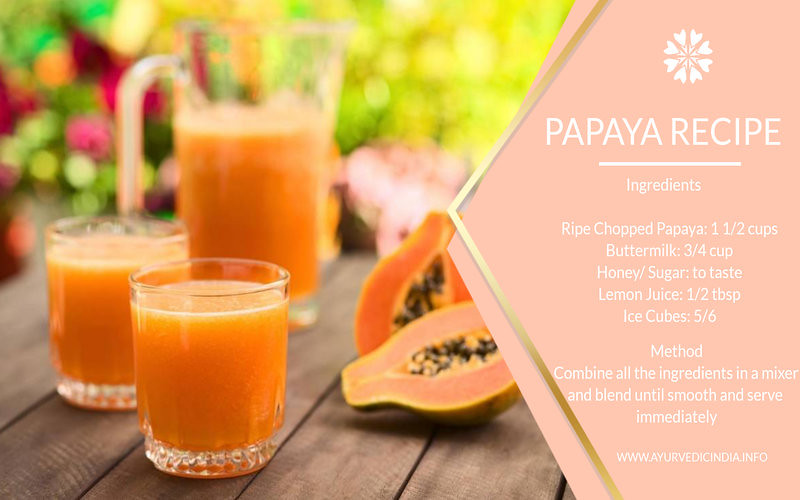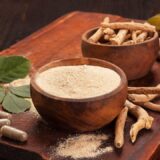Ayurvedic Uses of Papaya: Fruit, Leaves, Seeds & Side Effects
Papaya, also known as pawpaw or papaw, is a delicious fruit with incredible health benefits. Scientifically named Carica papaya Linn, it is globally recognized for its remarkable nutritional and therapeutic properties. The entire papaya plant—its fruit (ripe and unripe), leaves, seeds, stem, and juice—is widely used in Ayurveda for its medicinal qualities.
Papaya boasts a wide range of health benefits, including its ability to act as a uterotonic, fertility agent, antihypertensive, diuretic, anti-helminthic, hypolipidemic, anti-bacterial, anti-fungal, anti-tumor, and free radical scavenger. It is also praised for its wound-healing properties.
What makes papaya especially valuable is its abundance of enzymes (like papain), alkaloids, carotenoids, flavonoids, monoterpenes, vitamins, and minerals, all contribute to its therapeutic and health-boosting effects.
Papaya Nutrition Facts
Papaya is a nutritious fruit with several health benefits. Here’s a breakdown of the nutrition facts for one cup (about 230 grams) of mashed papaya based on the provided values:
- Calories: 98
- Carbohydrates: 8% of daily value
- Fiber: 15% of daily value
- Vitamin C: 233% of daily value
- Iron: 3% of daily value
- Vitamin A: 43% of daily value
- Magnesium: 12% of daily value
- Potassium: 11% of daily value
- Calcium: 4% of daily value
- Vitamin B-6: 5% of daily value
- Saturated Fat: 1%
These values show that papaya is an excellent source of Vitamin C and Vitamin A, contributing significantly to your daily intake of these nutrients. It’s also relatively low in calories and saturated fat, making it a healthy choice for most diets.
Ayurvedic Properties Of Papaya
In Ayurveda, papaya is valued for its various properties and effects on the body. Here’s a detailed look at its Ayurvedic attributes:
Rasa (Taste):
- Katu (Pungent): Papaya has a mildly pungent taste.
- Tikta (Bitter): It also has a hint of bitterness.
Guna (Properties):
- Laghu (Light for digestion): Papaya is considered light and easy to digest.
- Ruksa (Dry): It has a slightly dry quality.
- Tikshna (Pungent): Papaya is considered to have a sharp or penetrating quality.
Vipaka (Post-Digestive Effect):
- Katu (Pungent): After digestion, papaya imparts a pungent taste.
Veerya (Potency):
- Ushna (Hot): Papaya has a warming effect on the body.
Karma (Effects):
- Hridya (Benefits the heart): Papaya is said to be beneficial for heart health.
- Kaphavatahara (Pacifies Kapha and Vata dosha): It helps balance Kapha and Vata doshas, making it useful for conditions related to these doshas.
Overall, papaya is considered to be a beneficial fruit in Ayurveda, supporting digestion, and heart health, and helping to balance certain doshas.
Ayurvedic Characteristics
In Ayurveda, papaya is recognized for its potential benefits across various health conditions. Here’s how it addresses specific ailments and imbalances:
1. Kasa (Cough & Cold):
- Effect: Papaya can help alleviate symptoms of cough and cold due to its high vitamin C content, which supports the immune system and helps reduce inflammation in the respiratory tract.
2. Mandarin/Kaphaja (Low Digestive Fire):
- Effect: Papaya is considered to stimulate digestion and improve Agni (digestive fire). It can be helpful in cases where digestive capacity is low (Mandarin/Kaphaja conditions), as it aids in breaking down food and supporting digestive processes.
3. Plethora (Enlarged Spleen/Splenomegaly):
- Effect: While papaya is not a primary treatment for spleen enlargement, its general detoxifying and anti-inflammatory properties may support overall spleen health and function.
4. Shvayathu/Shotha (Swelling/Oedema/Inflammation):
- Effect: Papaya has anti-inflammatory properties, which can help reduce swelling and inflammation in conditions such as oedema and other inflammatory disorders.
5. Shasta/Shwasa Krichrata (Respiratory Disorders/Asthma):
- Effect: The fruit’s high vitamin C and enzyme content may be beneficial for respiratory health. It can help in managing asthma and other respiratory disorders by reducing inflammation and supporting lung function.
6. Visha/Upvisha (Toxic Conditions):
- Effect: Papaya’s detoxifying properties can aid in removing toxins from the body. Its enzymes, like papain, help in digestion and detoxification processes, which can be beneficial in cases of poisoning or toxic conditions.
7. Yakrutodara (Hepatomegaly/Enlarged Liver):
- Effect: Papaya is often used to support liver health. Its properties can help in reducing liver inflammation and supporting detoxification processes, potentially beneficial for conditions like hepatomegaly.
8. Pittaja (Excess Pitta):
- Effect: Papaya, being slightly cooling and less aggravating to Pitta dosha, can help balance conditions characterized by excess heat, such as acidity or inflammatory skin conditions. Its high vitamin C content also aids in soothing Pitta imbalances.
9. Agnimandya (Poor Digestive Fire):
- Effect: Papaya’s enzyme papain aids in digestion and can improve Agni (digestive fire), making it useful for conditions associated with poor digestion or sluggish metabolism. It helps in breaking down proteins and facilitating better nutrient absorption.
10. Rakta Pradara (Bleeding Disorders):
- Effect: Papaya is known to help strengthen capillaries and support blood health. Its high vitamin C and antioxidant content can aid in reducing bleeding disorders and promoting healthy blood vessels, which is beneficial for conditions like Rakta Pradara (bleeding disorders).
Note: While papaya can support health and address these conditions, it should be used as part of a balanced approach to treatment and always under the guidance of a healthcare provider or Ayurvedic practitioner, especially for serious conditions.
Benefits of Papaya According to Ayurveda
Here are the health benefits of papaya and its entire parts according to Ayurveda, unlocking the therapeutic potential of this versatile fruit.
1. Latex:
Uses: Papaya latex is versatile in traditional medicine, providing relief from dyspepsia and stomach pain. It acts as an anthelmintic to expel intestinal worms, soothes burns, alleviates diarrhea, and supports stomach health. It is also beneficial for whooping cough and bleeding hemorrhoids.
2. Ripe Fruits:
Uses: The ripe fruit of papaya is valued for its digestive benefits, acting as a stomachic to aid digestion and as a diuretic to support kidney function.
It serves as a carminative to relieve gas, an expectorant for chronic coughs, and a tonic and sedative for overall health. It also helps manage bleeding piles, obesity, psoriasis, and various skin conditions, including ringworm and wounds of the urinary tract.
3. Unripe Fruit:
Uses: Unripe papaya is noted for its diuretic and laxative effects. It can aid in managing an enlarged spleen when dried, support liver health, and act as an abortifacient in traditional practices.
Additionally, it helps in treating snakebites, possesses antibacterial activity, and has anti-implantation properties.
4. Seeds:
Uses: Papaya seeds are used as an emmenagogue to stimulate menstrual flow and as a carminative to relieve digestive discomfort.
They are also known as counter-irritants and have abortifacient properties. The paste made from seeds is applied for treating psoriasis, male infertility, and ringworm.
5. Seed Juice:
Uses: The juice extracted from papaya seeds is used to address issues like an enlarged liver and spleen. It is also beneficial for managing bleeding piles.
6. Root:
Uses: The root of the papaya plant acts as a diuretic and has abortifacient and anti-fungal properties. It is also used to treat piles and regulate irregular uterine bleeding.
7. Leaves:
Uses: Papaya leaves have numerous applications. They can be used as a vegetable and in wound care. A fine paste of the leaves is applied for jaundice, while the infusion helps with gonorrhea and urinary complaints.
They are also used in treating colic, as a vermifuge, and for conditions like beriberi, fever, and abortion. The smoke from papaya leaves is traditionally used to manage asthma.
7. Flowers:
Uses: Papaya flowers are utilized for their emmenagogue properties to support menstrual health. They also help in treating jaundice, possess pectoral properties to aid the lungs, and act as a febrifuge to reduce fever.
8. Stem Bark:
Uses: The bark of the papaya stem has anti-hemolytic activity and is used for sore teeth when applied internally. It also exhibits anti-fungal properties, and is used in traditional medicine for treating jaundice, dengue fever, and sexually transmitted diseases.
9. Papaya Pulp:
Uses: The pulp of papaya is highly regarded for its soothing and healing properties. It is used topically to treat minor cuts, burns, and bruises due to its gentle exfoliating and antimicrobial properties.
Additionally, papaya pulp can be used in facial masks to rejuvenate and brighten the skin, thanks to its enzymatic action and high vitamin content, which helps in reducing blemishes and promoting a youthful complexion. It also aids in digestion when consumed, supporting overall gut health.
Top 10 Incredible Health Benefits of Papaya
Below are the Top 10 Incredible Health Benefits of Papaya, plus an extra reason why you should add it to your diet!
1. Rich in Nutrients
Papaya is a powerhouse of essential vitamins and minerals. One cup of papaya provides a significant amount of Vitamin C, Vitamin A, folate, potassium, and magnesium.
These nutrients support various bodily functions, including immune response, vision, and cellular repair, making papaya a highly nutritious fruit.
2. Boosts Immune System
Papaya’s high Vitamin C content plays a crucial role in enhancing the immune system. Vitamin C helps stimulate the production of white blood cells, which are vital for fighting off infections.
Additionally, papaya’s antioxidants combat oxidative stress, further strengthening immune defenses against common illnesses.
3. Supports Digestive Health:
Papaya contains the enzyme papain, which assists in breaking down proteins and improving digestion. This enzyme, combined with papaya’s dietary fiber, can alleviate symptoms of indigestion, bloating, and constipation.
Regular consumption may promote a healthy digestive system and enhance nutrient absorption.
4. Anti-Inflammatory Properties
The antioxidants and enzymes in papaya, such as papain and chymopapain, have natural anti-inflammatory effects.
These compounds can help reduce inflammation in the body, potentially benefiting those with chronic inflammatory conditions like arthritis and aiding in the relief of joint pain and swelling.
5. Promotes Healthy Skin:
Papaya’s vitamins A and C are vital for skin health. Vitamin C aids in collagen production, ewhich is ssential for skin elasticity and firmness.
Vitamin A helps repair skin tissue and combat signs of aging, such as wrinkles and fine lines. Regular use or consumption of papaya can result in a healthier, more youthful complexion.
6. Supports Heart Health
Papaya is beneficial for heart health due to its high fiber content, potassium, and antioxidants. Fiber helps lower cholesterol levels, while potassium helps manage blood pressure by counteracting sodium’s effects.
Additionally, antioxidants in papaya protect the heart from oxidative damage, promoting overall cardiovascular well-being.
7. Enhances Eye Health
Rich in Vitamin A and beta-carotene, papaya supports eye health by maintaining good vision and preventing age-related macular degeneration.
These nutrients are crucial for maintaining the health of the retina and cornea, and they protect against oxidative stress that can lead to vision problems.
8. Aids in Weight Management
Papaya is low in calories yet high in fiber, which can help with weight management. The fiber content promotes satiety, reducing overall calorie intake.
Additionally, the fruit’s natural sweetness can satisfy sugar cravings, making it a healthy and satisfying option for those looking to control their weight.
9. Detoxifies the Body
Papaya’s detoxifying properties support liver function and aid in cleansing the digestive tract. The fruit’s enzymes and antioxidants help remove toxins from the body.
Which can improve overall liver health and enhance the body’s ability to eliminate waste products effectively.
10. Improve Bone Health
Papaya contains Vitamin K, calcium, and magnesium, which are important for maintaining bone health. Vitamin K plays a role in bone mineralization, while calcium and magnesium support bone density and strength.
Regular consumption can help prevent bone-related conditions like osteoporosis and support overall skeletal health.
Each of these benefits highlights how papaya can contribute to various aspects of health, making it a valuable addition to a balanced diet.
Dosage
The dosage of different parts of the papaya plant used in traditional remedies:
Leaf Infusion:
- Dosage: 40-80 ml
- Usage: Papaya leaf infusion is often used for its health benefits such as improving platelet count, aiding digestion, and supporting liver function. The infusion is prepared by steeping the dried or fresh leaves in hot water.
Seed Powder:
- Dosage: 0.5-1 g
- Usage: Papaya seed powder is used for its digestive and detoxifying properties. It can be taken as a supplement or added to smoothies or other foods. Due to its potent nature, it’s usually recommended to start with a smaller dose.
Latex:
- Dosage: 3-6 g
- Usage: Papaya latex, or milky sap, is used in very small quantities due to its strong enzymatic activity. It is applied topically or taken under guidance for specific conditions such as digestive issues or skin ailments.
Important Notes:
- Consultation: Always consult a healthcare provider or a qualified Ayurvedic practitioner before starting any new treatment, especially with potent substances like papaya latex.
- Precautions: Excessive use of papaya latex and seeds may lead to gastrointestinal discomfort or other side effects, so adherence to recommended dosages is crucial.
Papaya Side Effects – Precautions & Warnings
1. Pregnancy and Breastfeeding:
Consuming unripe papaya or papaya with high papain levels during pregnancy can be unsafe, potentially leading to birth defects or miscarriage. It’s recommended to avoid or limit papaya intake and consult a healthcare provider while breastfeeding.
2. Diabetes:
Fermented papaya can significantly lower blood sugar levels. For individuals with diabetes who are on medication, it is crucial to monitor blood sugar levels regularly. Adjustments to medication or diet may be necessary to prevent hypoglycemia (low blood sugar). Always consult with a healthcare provider before making dietary changes.
3. Hypoglycemia:
Fermented papaya has the potential to lower blood sugar levels, which can be problematic for those with hypoglycemia. Individuals taking medication for hypoglycemia should be cautious, as consuming papaya may cause excessively low blood sugar levels. Monitoring blood sugar closely and consulting with a healthcare provider is recommended.
4. Allergy:
Papaya contains an enzyme called papain, which can trigger allergic reactions in some individuals. Those with known allergies to papain should avoid consuming papaya or using products containing papaya extracts to prevent allergic responses.
5. Surgery:
Fermented papaya can impact blood sugar levels, potentially disrupting blood sugar management during and after surgery. To prevent complications, it’s recommended to stop consuming papaya at least two weeks before surgery, ensuring stable blood sugar levels.
Papaya is a nutritious fruit that offers a range of health benefits, particularly for heart health. Its fiber, potassium, and antioxidants work together to lower cholesterol, regulate blood pressure, and protect the heart from damage.
Resources:
- Papaya, dengue fever and Ayurveda(1)
- Carica papaya L. Leaves: Deciphering Its Antioxidant Bioactives, Biological Activities, Innovative Products, and Safety Aspects(2)
- Study of the Antimicrobial Activity and Synergistic Inhibitory Activity of Carica papaya leaves extract with Antibiotics on Escherichia coli(3)
- Ethnomedicinal uses, nutritional composition, phytochemistry and potential health benefits of Carica papaya(4)


























very informative post for me as I am always looking for new content that can help me and my knowledge grow better.
Never thought that papaya and its leaves will be so beneficial to human body. Thanks for this amazing article as it was so informative and I will definitely share to someone battling diseases like dengue and cancer. Papaya leaf juice so many nutrients and it helps in fighting the dengue well by increasing the immunity and platelet count. Thanks for sharing this impressive piece of information among us. Keep up the good work.